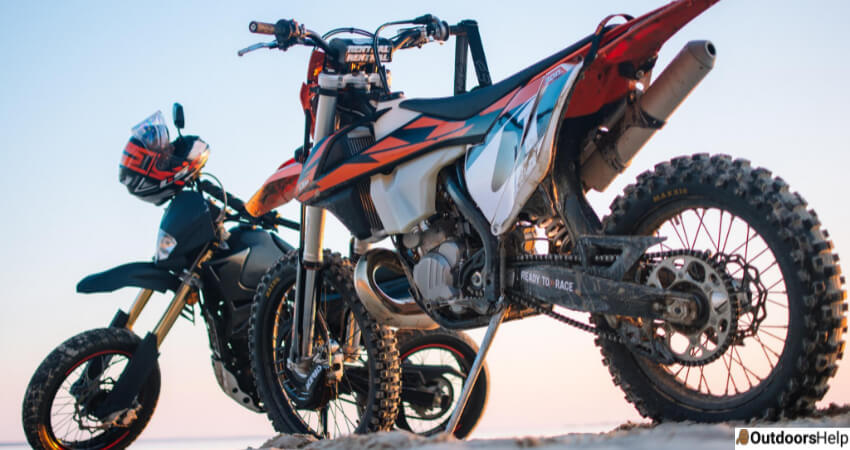Riding your dirt bike is an adventurous experience that relieves stress. However, you must be aware that a dirt bike is not any other bike you can ride anywhere. There are a specific set of laws and regulations to govern dirt bike riders on where to ride in public. Rules vary according to where you are riding; hence it is advisable to check the laws applicable in your locality.
Dirt bikes are noisy and loud; hence they cause unnecessary disruptions. This attribute makes it illegal to ride your dirt bike in most neighborhoods. Nonetheless, a few states, such as Indiana, don’t prohibit riding dirt bikes in neighborhoods. Though neighbors might be uncomfortable with the bike’s sound, no law restricts you from riding your dirt bike anywhere in Indiana.
Unlike other bikes, standard dirt bikes don’t feature tail lights, headlights, and other parts featured on street-legal bikes. You can also ride your dirt bike without a license depending on the laws applicable in your state.
Where Can I Ride My Dirt Bike?
Unless you stay in Indiana, it is impossible to enjoy riding your dirt bike in the neighborhood. Then where can you ride the dirt bike safely and legally without disruptions? If you are stuck with this quiz, read this article to the end. We have explored places where you can legally ride your dirt bike without getting into anybody’s nerves.
1. Private Properties
You are free to ride your dirt bike on private property. None will restrict you from riding your bike, but beware that noise pollution rules are still applicable. Therefore, if the property is near other people’s homes, you still can’t ride your bike there.
Please consult your local city council or read the rules published on the city’s website to determine whether it is legal to ride your dirt bike on private property. Different localities have varying regulations in this regard.
2. State Trails
State trails or riding parks are other options where you can ride your dirt bike without any restrictions. Even though you can ride in state trails, ensure that you familiarize yourself with rules and laws applicable to any state park you desire to ride your bike. Some of the parks might allow you to ride your bike without registering or modifying it.
However, other parks might come with a set of requirements that you must fulfill before riding your bike. for instance, some parks require you to register your bike by paying the membership fee. So, it is wise to research whenever you head out to a new state trail.
Here are some of the standard requirements when riding a dirt bike on state trails:
1. A registration sticker
2. Approved spark arrestor.
3. Correct riding gear such as goggles, helmets, boots, and gloves.
4. If you are under 18 years, you require the presence of an adult or a signed waiver.
5. Membership fee if applicable.
6. Exhaust sound level limit.
3. Motocross Tracks
The motocross is an ideal place to ride your dirt bike legally. If you are a beginner on dirt bikes, you have to take extra caution since the place is always overcrowded with dirt bikes. The motocross presents numerous dangers to riders, especially new ones, hence the need to be careful.
Motocross tracks are usually far away from people, but it is possible to encounter people who don’t welcome the dirt bike’s loud sound on your way. Try being friendly and courteous to them, and above all, wear your head helmet.
4. All-Terrain Vehicles (ATV) Trails
You are allowed to ride your dirt bike in most ATV trails. Nonetheless, there are rules governing most of these trails. For instance, you must wear a helmet and be of age to be allowed to ride on ATV trails.
These regulations may vary from state to state. To be sure about the rules to follow, research the applicable laws in your state and adhere to them. However, whichever rules are relevant, it is wise always to wear your helmet and carry your driving license while riding.
What Happens If I Ride My Dirt Bike In A Restricted Area?
There are numerous consequences associated with riding your dirt bike in a prohibited area. The repercussions depend on the rule that you have violated.
The bike can be impounded; you might get lengthy probation, be fined, get a jail term, or get a simple citation depending on your offense.
It is worse to ride in the neighborhood since you might end up paying dearly. You can be liable to complaints from your neighbors, a Home Owner’s Association citation, or a heavy punishment from relevant law authorities.
Street-Legal Dirt Bikes
Most states ban dirt bikes from the roads and neighborhoods because they are not street-legal. Nonetheless, you can be wiser and modify your bike, register it, get a title, and apply for the license.
When equipped with all the above documents, it is possible to ride your bike on the streets. When you modify your dirt bike into a street-legal dirt bike, it might become a dual sports bike, an adventure bike, or a supermoto/Motard bike.
Before you convert your dirt bike into a street-legal bike, familiarize yourself with local laws to be sure of acceptable modifications.
Frequently Asked Questions
1. Do I Require A License To Ride A Dirt Bike?
If you are riding off-road, you don’t require a license. However, if you are riding a dual sport dirt bike allowed on the roads, you must be an adult with a valid driving license. Besides the driver’s license, you must also have a motorcycle license for your dual sportbike.
2. At What Age Am I Allowed To Ride A Dirt Bike?
The right age allowed to ride a dirt bike depends on the state you live in. While some states don’t have age restrictions, others require the presence of a parent or a guardian if you are not of age. Check with the local laws to be sure of the acceptable age.
The Takeaway
Though we desire to get the most out of the dirt bikes, riding them in legal areas is a wise idea that helps you to avoid confrontations. Although the rules differ from place to place, most states prohibit you from riding in your neighborhood streets.

